NUM1204 Assessment 1: Factors in Caregiver Health Literacy Report
VerifiedAdded on 2022/08/25
|11
|2250
|27
Report
AI Summary
This report delves into the critical factors impacting the health literacy of family caregivers for the elderly population, employing an evidence-based practice (EBP) approach. The study begins by justifying the application of EBP in nursing, emphasizing its importance for patient safety, especially given the vulnerabilities of the elderly. The report then formulates an answerable research question and breaks it down using the PICO (Population, Intervention, Comparison, Outcome) framework to guide the literature search. A detailed search strategy protocol is outlined, including the selection of relevant databases (Medline, PubMed, Scopus, etc.) and the use of appropriate keywords to retrieve pertinent articles within the last five years. The process of refining the search results is described, including the initial retrieval of articles, the filtering process, and the final selection of relevant studies. The report highlights the significance of EBP in healthcare for improving the quality of care and promoting positive patient outcomes. Finally, the report includes a comprehensive reference list of sources used and relevant appendices, offering a structured and insightful analysis of the factors influencing caregiver health literacy and demonstrating the application of EBP in addressing this important issue.
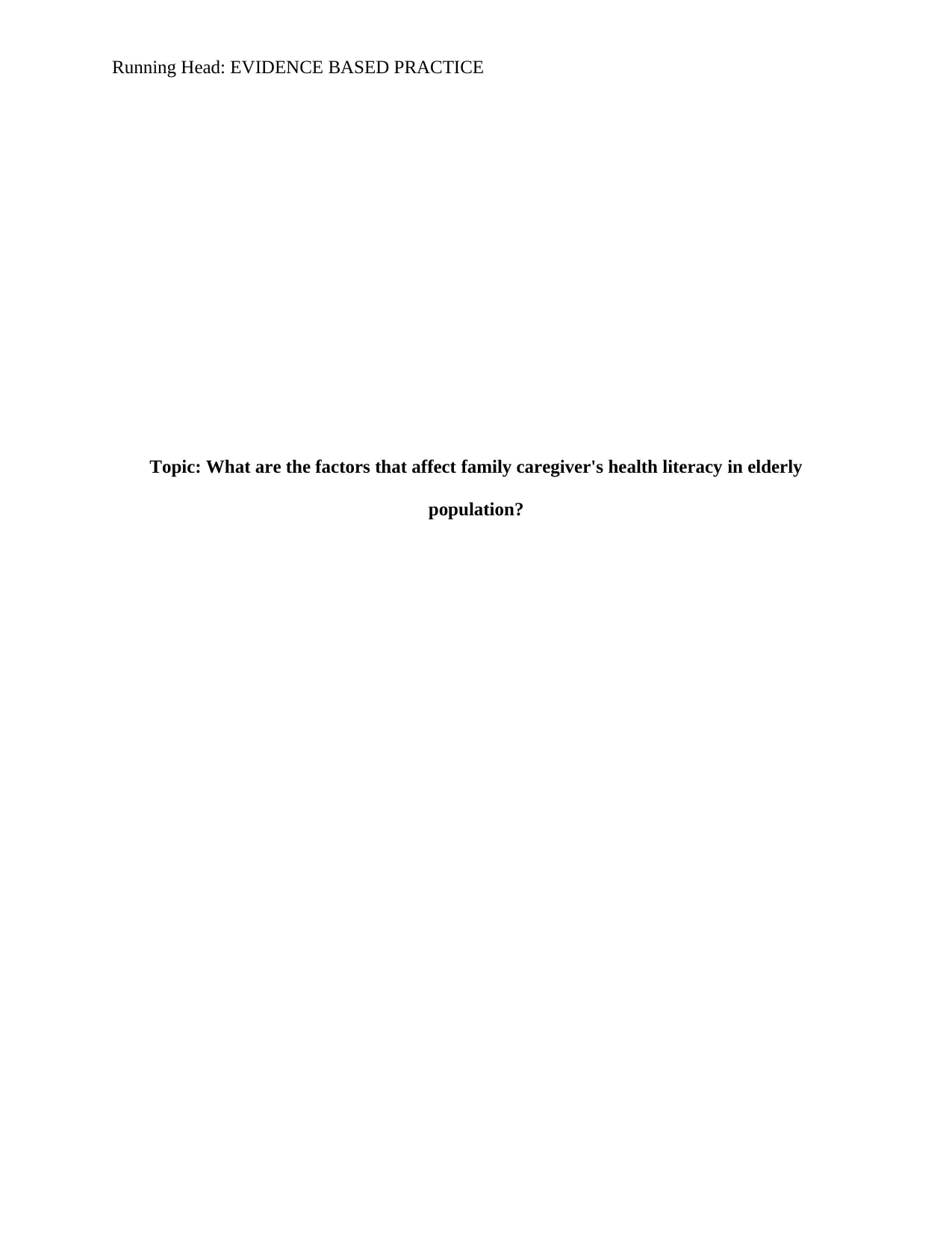
Running Head: EVIDENCE BASED PRACTICE
Topic: What are the factors that affect family caregiver's health literacy in elderly
population?
Topic: What are the factors that affect family caregiver's health literacy in elderly
population?
Paraphrase This Document
Need a fresh take? Get an instant paraphrase of this document with our AI Paraphraser
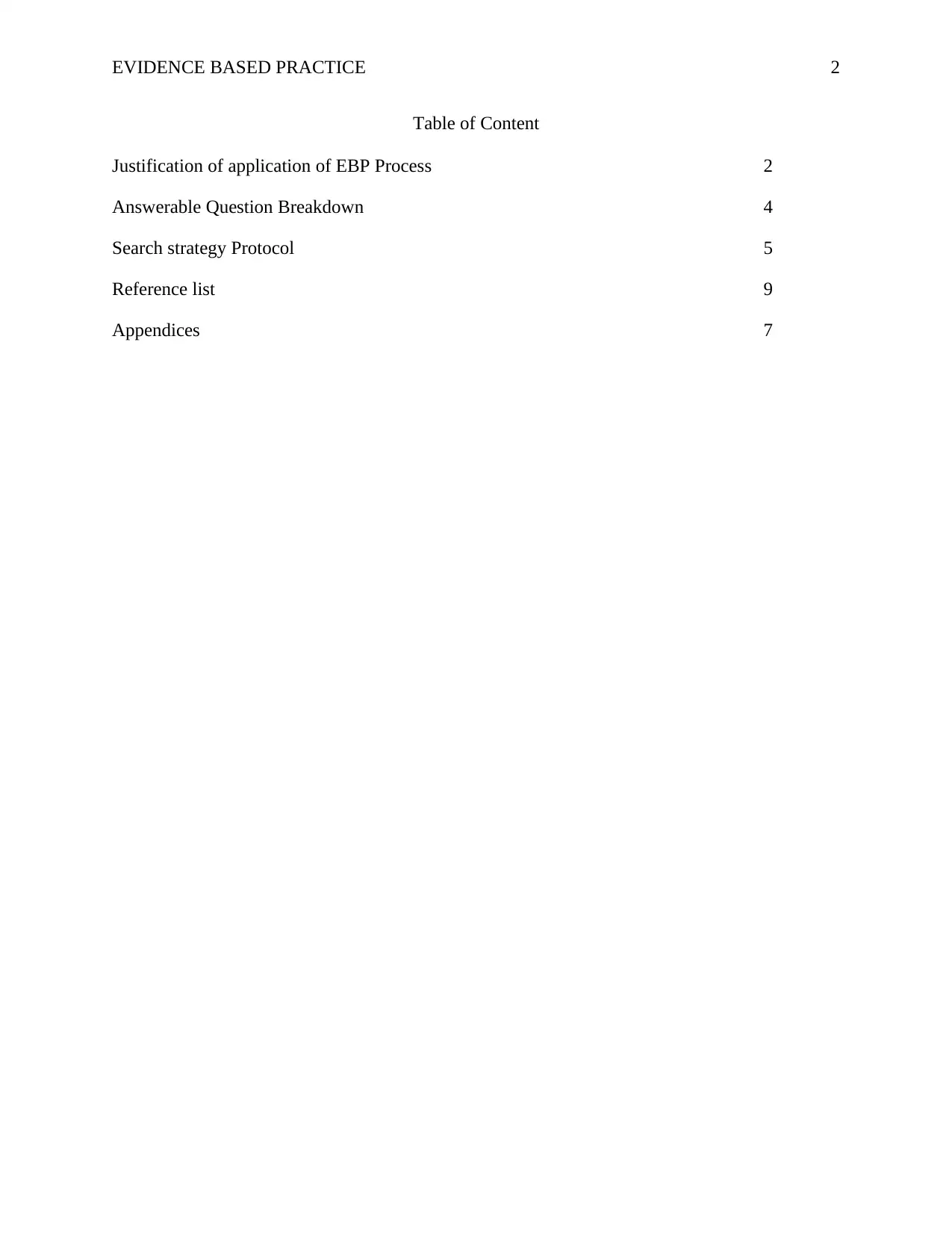
EVIDENCE BASED PRACTICE 2
Table of Content
Justification of application of EBP Process 2
Answerable Question Breakdown 4
Search strategy Protocol 5
Reference list 9
Appendices 7
Table of Content
Justification of application of EBP Process 2
Answerable Question Breakdown 4
Search strategy Protocol 5
Reference list 9
Appendices 7
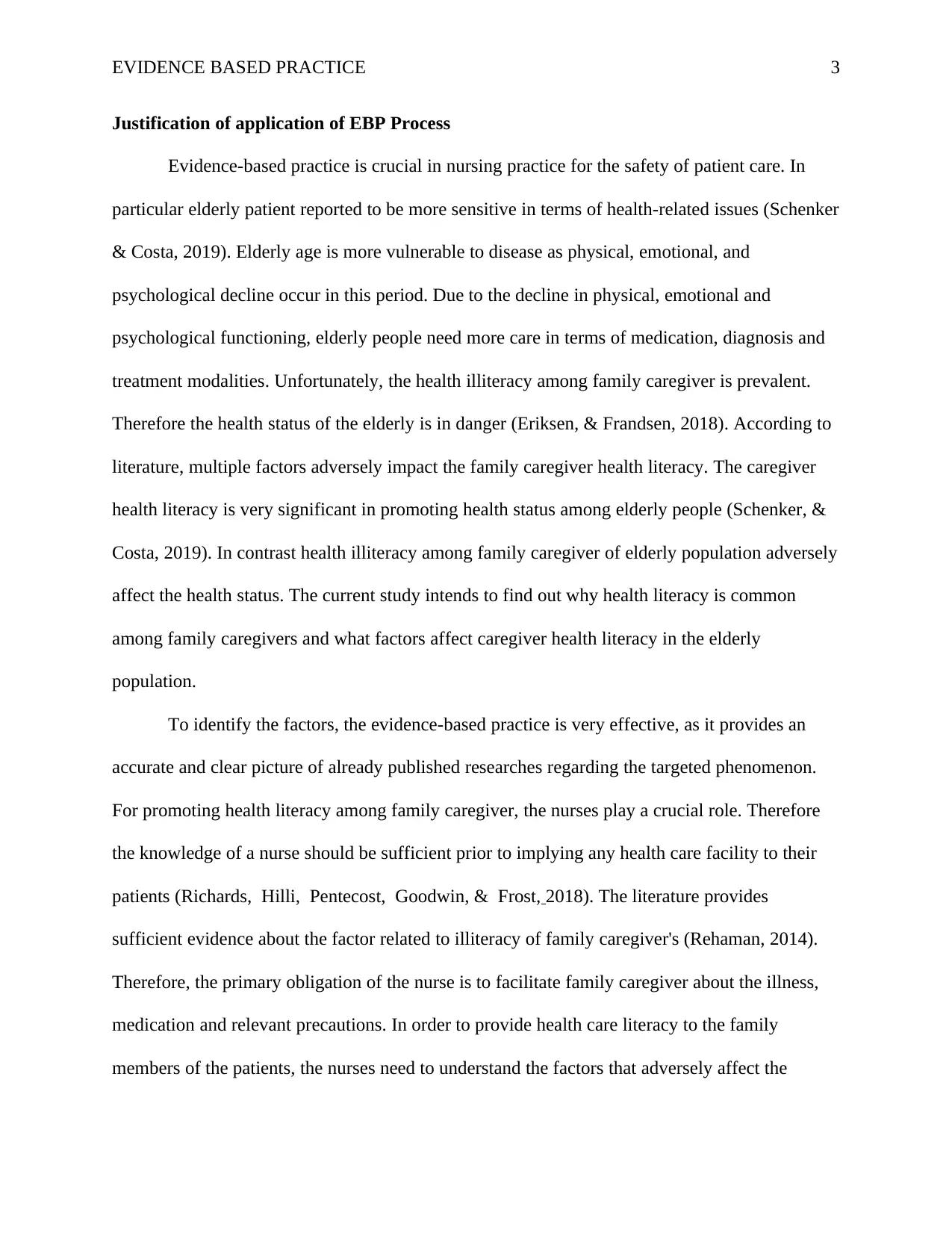
EVIDENCE BASED PRACTICE 3
Justification of application of EBP Process
Evidence-based practice is crucial in nursing practice for the safety of patient care. In
particular elderly patient reported to be more sensitive in terms of health-related issues (Schenker
& Costa, 2019). Elderly age is more vulnerable to disease as physical, emotional, and
psychological decline occur in this period. Due to the decline in physical, emotional and
psychological functioning, elderly people need more care in terms of medication, diagnosis and
treatment modalities. Unfortunately, the health illiteracy among family caregiver is prevalent.
Therefore the health status of the elderly is in danger (Eriksen, & Frandsen, 2018). According to
literature, multiple factors adversely impact the family caregiver health literacy. The caregiver
health literacy is very significant in promoting health status among elderly people (Schenker, &
Costa, 2019). In contrast health illiteracy among family caregiver of elderly population adversely
affect the health status. The current study intends to find out why health literacy is common
among family caregivers and what factors affect caregiver health literacy in the elderly
population.
To identify the factors, the evidence-based practice is very effective, as it provides an
accurate and clear picture of already published researches regarding the targeted phenomenon.
For promoting health literacy among family caregiver, the nurses play a crucial role. Therefore
the knowledge of a nurse should be sufficient prior to implying any health care facility to their
patients (Richards, Hilli, Pentecost, Goodwin, & Frost, 2018). The literature provides
sufficient evidence about the factor related to illiteracy of family caregiver's (Rehaman, 2014).
Therefore, the primary obligation of the nurse is to facilitate family caregiver about the illness,
medication and relevant precautions. In order to provide health care literacy to the family
members of the patients, the nurses need to understand the factors that adversely affect the
Justification of application of EBP Process
Evidence-based practice is crucial in nursing practice for the safety of patient care. In
particular elderly patient reported to be more sensitive in terms of health-related issues (Schenker
& Costa, 2019). Elderly age is more vulnerable to disease as physical, emotional, and
psychological decline occur in this period. Due to the decline in physical, emotional and
psychological functioning, elderly people need more care in terms of medication, diagnosis and
treatment modalities. Unfortunately, the health illiteracy among family caregiver is prevalent.
Therefore the health status of the elderly is in danger (Eriksen, & Frandsen, 2018). According to
literature, multiple factors adversely impact the family caregiver health literacy. The caregiver
health literacy is very significant in promoting health status among elderly people (Schenker, &
Costa, 2019). In contrast health illiteracy among family caregiver of elderly population adversely
affect the health status. The current study intends to find out why health literacy is common
among family caregivers and what factors affect caregiver health literacy in the elderly
population.
To identify the factors, the evidence-based practice is very effective, as it provides an
accurate and clear picture of already published researches regarding the targeted phenomenon.
For promoting health literacy among family caregiver, the nurses play a crucial role. Therefore
the knowledge of a nurse should be sufficient prior to implying any health care facility to their
patients (Richards, Hilli, Pentecost, Goodwin, & Frost, 2018). The literature provides
sufficient evidence about the factor related to illiteracy of family caregiver's (Rehaman, 2014).
Therefore, the primary obligation of the nurse is to facilitate family caregiver about the illness,
medication and relevant precautions. In order to provide health care literacy to the family
members of the patients, the nurses need to understand the factors that adversely affect the
⊘ This is a preview!⊘
Do you want full access?
Subscribe today to unlock all pages.

Trusted by 1+ million students worldwide
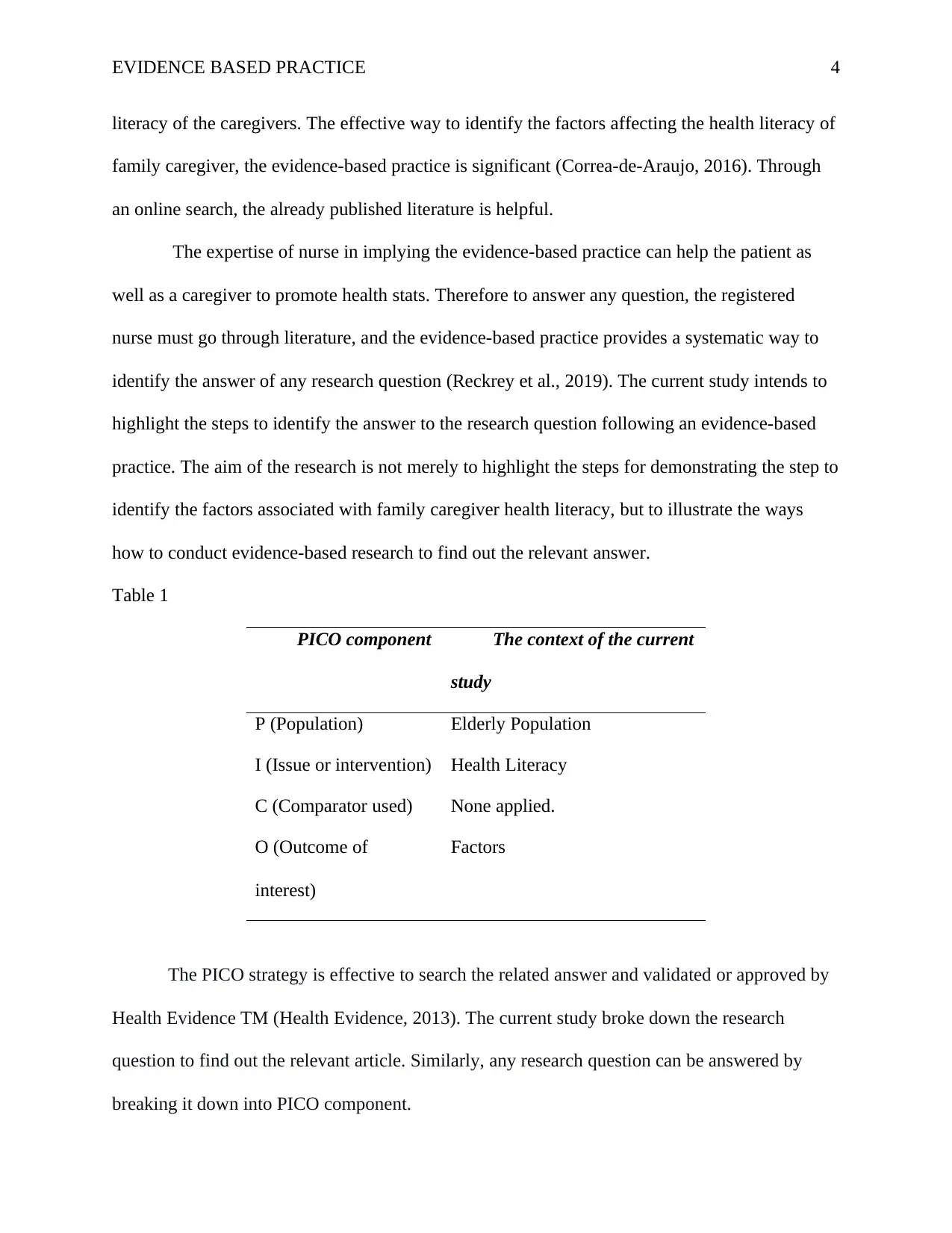
EVIDENCE BASED PRACTICE 4
literacy of the caregivers. The effective way to identify the factors affecting the health literacy of
family caregiver, the evidence-based practice is significant (Correa-de-Araujo, 2016). Through
an online search, the already published literature is helpful.
The expertise of nurse in implying the evidence-based practice can help the patient as
well as a caregiver to promote health stats. Therefore to answer any question, the registered
nurse must go through literature, and the evidence-based practice provides a systematic way to
identify the answer of any research question (Reckrey et al., 2019). The current study intends to
highlight the steps to identify the answer to the research question following an evidence-based
practice. The aim of the research is not merely to highlight the steps for demonstrating the step to
identify the factors associated with family caregiver health literacy, but to illustrate the ways
how to conduct evidence-based research to find out the relevant answer.
Table 1
PICO component The context of the current
study
P (Population) Elderly Population
I (Issue or intervention) Health Literacy
C (Comparator used) None applied.
O (Outcome of
interest)
Factors
The PICO strategy is effective to search the related answer and validated or approved by
Health Evidence TM (Health Evidence, 2013). The current study broke down the research
question to find out the relevant article. Similarly, any research question can be answered by
breaking it down into PICO component.
literacy of the caregivers. The effective way to identify the factors affecting the health literacy of
family caregiver, the evidence-based practice is significant (Correa-de-Araujo, 2016). Through
an online search, the already published literature is helpful.
The expertise of nurse in implying the evidence-based practice can help the patient as
well as a caregiver to promote health stats. Therefore to answer any question, the registered
nurse must go through literature, and the evidence-based practice provides a systematic way to
identify the answer of any research question (Reckrey et al., 2019). The current study intends to
highlight the steps to identify the answer to the research question following an evidence-based
practice. The aim of the research is not merely to highlight the steps for demonstrating the step to
identify the factors associated with family caregiver health literacy, but to illustrate the ways
how to conduct evidence-based research to find out the relevant answer.
Table 1
PICO component The context of the current
study
P (Population) Elderly Population
I (Issue or intervention) Health Literacy
C (Comparator used) None applied.
O (Outcome of
interest)
Factors
The PICO strategy is effective to search the related answer and validated or approved by
Health Evidence TM (Health Evidence, 2013). The current study broke down the research
question to find out the relevant article. Similarly, any research question can be answered by
breaking it down into PICO component.
Paraphrase This Document
Need a fresh take? Get an instant paraphrase of this document with our AI Paraphraser
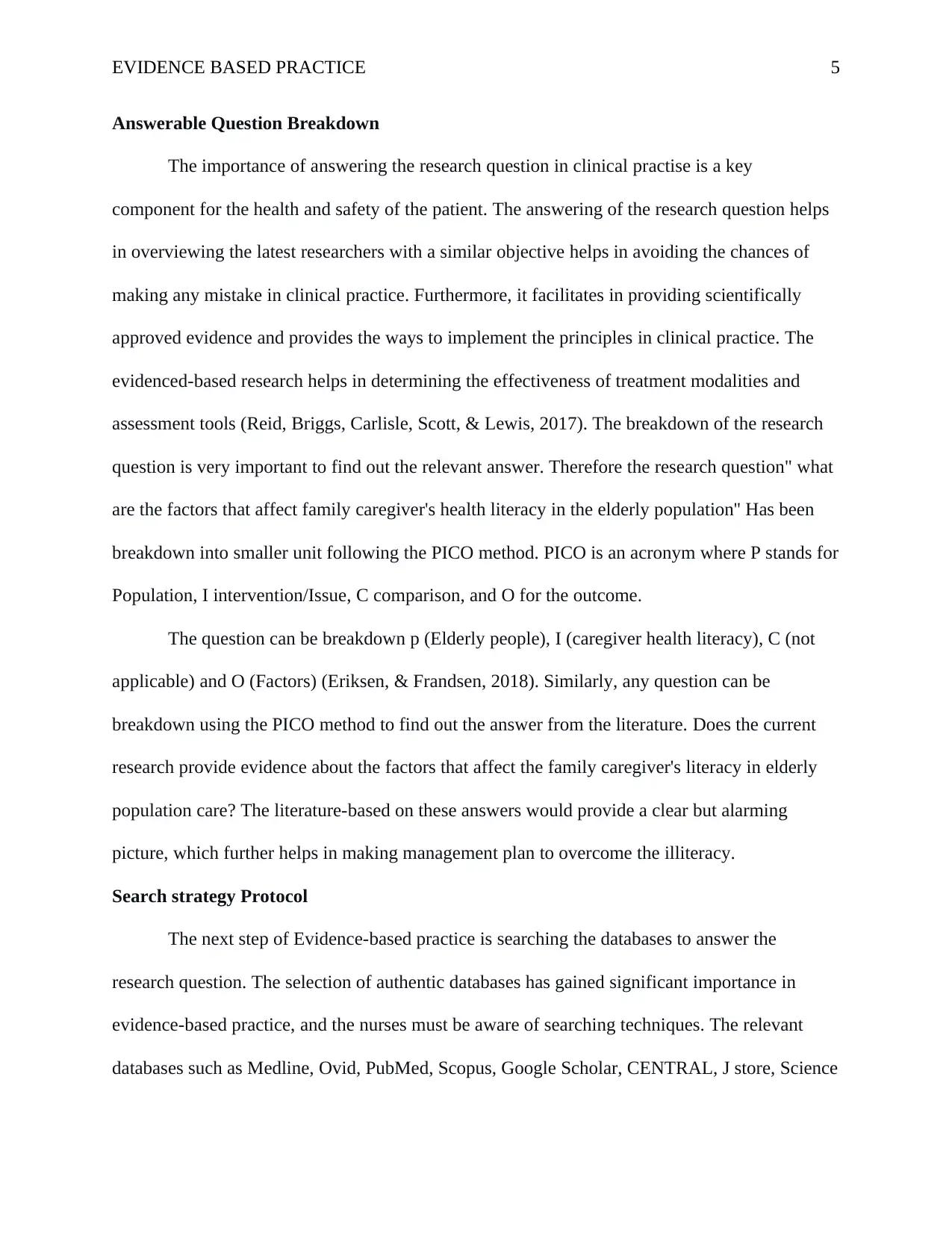
EVIDENCE BASED PRACTICE 5
Answerable Question Breakdown
The importance of answering the research question in clinical practise is a key
component for the health and safety of the patient. The answering of the research question helps
in overviewing the latest researchers with a similar objective helps in avoiding the chances of
making any mistake in clinical practice. Furthermore, it facilitates in providing scientifically
approved evidence and provides the ways to implement the principles in clinical practice. The
evidenced-based research helps in determining the effectiveness of treatment modalities and
assessment tools (Reid, Briggs, Carlisle, Scott, & Lewis, 2017). The breakdown of the research
question is very important to find out the relevant answer. Therefore the research question" what
are the factors that affect family caregiver's health literacy in the elderly population'' Has been
breakdown into smaller unit following the PICO method. PICO is an acronym where P stands for
Population, I intervention/Issue, C comparison, and O for the outcome.
The question can be breakdown p (Elderly people), I (caregiver health literacy), C (not
applicable) and O (Factors) (Eriksen, & Frandsen, 2018). Similarly, any question can be
breakdown using the PICO method to find out the answer from the literature. Does the current
research provide evidence about the factors that affect the family caregiver's literacy in elderly
population care? The literature-based on these answers would provide a clear but alarming
picture, which further helps in making management plan to overcome the illiteracy.
Search strategy Protocol
The next step of Evidence-based practice is searching the databases to answer the
research question. The selection of authentic databases has gained significant importance in
evidence-based practice, and the nurses must be aware of searching techniques. The relevant
databases such as Medline, Ovid, PubMed, Scopus, Google Scholar, CENTRAL, J store, Science
Answerable Question Breakdown
The importance of answering the research question in clinical practise is a key
component for the health and safety of the patient. The answering of the research question helps
in overviewing the latest researchers with a similar objective helps in avoiding the chances of
making any mistake in clinical practice. Furthermore, it facilitates in providing scientifically
approved evidence and provides the ways to implement the principles in clinical practice. The
evidenced-based research helps in determining the effectiveness of treatment modalities and
assessment tools (Reid, Briggs, Carlisle, Scott, & Lewis, 2017). The breakdown of the research
question is very important to find out the relevant answer. Therefore the research question" what
are the factors that affect family caregiver's health literacy in the elderly population'' Has been
breakdown into smaller unit following the PICO method. PICO is an acronym where P stands for
Population, I intervention/Issue, C comparison, and O for the outcome.
The question can be breakdown p (Elderly people), I (caregiver health literacy), C (not
applicable) and O (Factors) (Eriksen, & Frandsen, 2018). Similarly, any question can be
breakdown using the PICO method to find out the answer from the literature. Does the current
research provide evidence about the factors that affect the family caregiver's literacy in elderly
population care? The literature-based on these answers would provide a clear but alarming
picture, which further helps in making management plan to overcome the illiteracy.
Search strategy Protocol
The next step of Evidence-based practice is searching the databases to answer the
research question. The selection of authentic databases has gained significant importance in
evidence-based practice, and the nurses must be aware of searching techniques. The relevant
databases such as Medline, Ovid, PubMed, Scopus, Google Scholar, CENTRAL, J store, Science
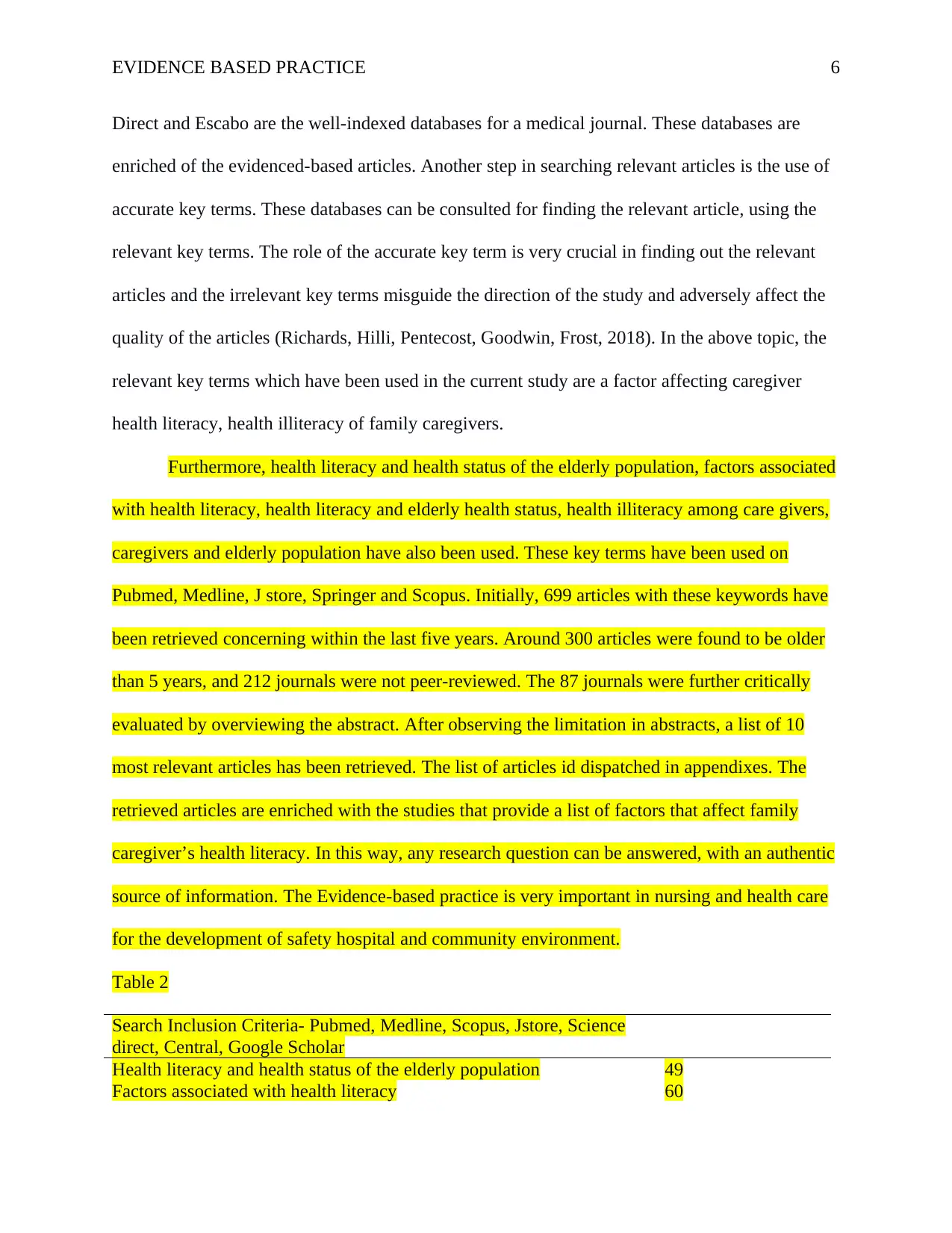
EVIDENCE BASED PRACTICE 6
Direct and Escabo are the well-indexed databases for a medical journal. These databases are
enriched of the evidenced-based articles. Another step in searching relevant articles is the use of
accurate key terms. These databases can be consulted for finding the relevant article, using the
relevant key terms. The role of the accurate key term is very crucial in finding out the relevant
articles and the irrelevant key terms misguide the direction of the study and adversely affect the
quality of the articles (Richards, Hilli, Pentecost, Goodwin, Frost, 2018). In the above topic, the
relevant key terms which have been used in the current study are a factor affecting caregiver
health literacy, health illiteracy of family caregivers.
Furthermore, health literacy and health status of the elderly population, factors associated
with health literacy, health literacy and elderly health status, health illiteracy among care givers,
caregivers and elderly population have also been used. These key terms have been used on
Pubmed, Medline, J store, Springer and Scopus. Initially, 699 articles with these keywords have
been retrieved concerning within the last five years. Around 300 articles were found to be older
than 5 years, and 212 journals were not peer-reviewed. The 87 journals were further critically
evaluated by overviewing the abstract. After observing the limitation in abstracts, a list of 10
most relevant articles has been retrieved. The list of articles id dispatched in appendixes. The
retrieved articles are enriched with the studies that provide a list of factors that affect family
caregiver’s health literacy. In this way, any research question can be answered, with an authentic
source of information. The Evidence-based practice is very important in nursing and health care
for the development of safety hospital and community environment.
Table 2
Search Inclusion Criteria- Pubmed, Medline, Scopus, Jstore, Science
direct, Central, Google Scholar
Health literacy and health status of the elderly population 49
Factors associated with health literacy 60
Direct and Escabo are the well-indexed databases for a medical journal. These databases are
enriched of the evidenced-based articles. Another step in searching relevant articles is the use of
accurate key terms. These databases can be consulted for finding the relevant article, using the
relevant key terms. The role of the accurate key term is very crucial in finding out the relevant
articles and the irrelevant key terms misguide the direction of the study and adversely affect the
quality of the articles (Richards, Hilli, Pentecost, Goodwin, Frost, 2018). In the above topic, the
relevant key terms which have been used in the current study are a factor affecting caregiver
health literacy, health illiteracy of family caregivers.
Furthermore, health literacy and health status of the elderly population, factors associated
with health literacy, health literacy and elderly health status, health illiteracy among care givers,
caregivers and elderly population have also been used. These key terms have been used on
Pubmed, Medline, J store, Springer and Scopus. Initially, 699 articles with these keywords have
been retrieved concerning within the last five years. Around 300 articles were found to be older
than 5 years, and 212 journals were not peer-reviewed. The 87 journals were further critically
evaluated by overviewing the abstract. After observing the limitation in abstracts, a list of 10
most relevant articles has been retrieved. The list of articles id dispatched in appendixes. The
retrieved articles are enriched with the studies that provide a list of factors that affect family
caregiver’s health literacy. In this way, any research question can be answered, with an authentic
source of information. The Evidence-based practice is very important in nursing and health care
for the development of safety hospital and community environment.
Table 2
Search Inclusion Criteria- Pubmed, Medline, Scopus, Jstore, Science
direct, Central, Google Scholar
Health literacy and health status of the elderly population 49
Factors associated with health literacy 60
⊘ This is a preview!⊘
Do you want full access?
Subscribe today to unlock all pages.

Trusted by 1+ million students worldwide
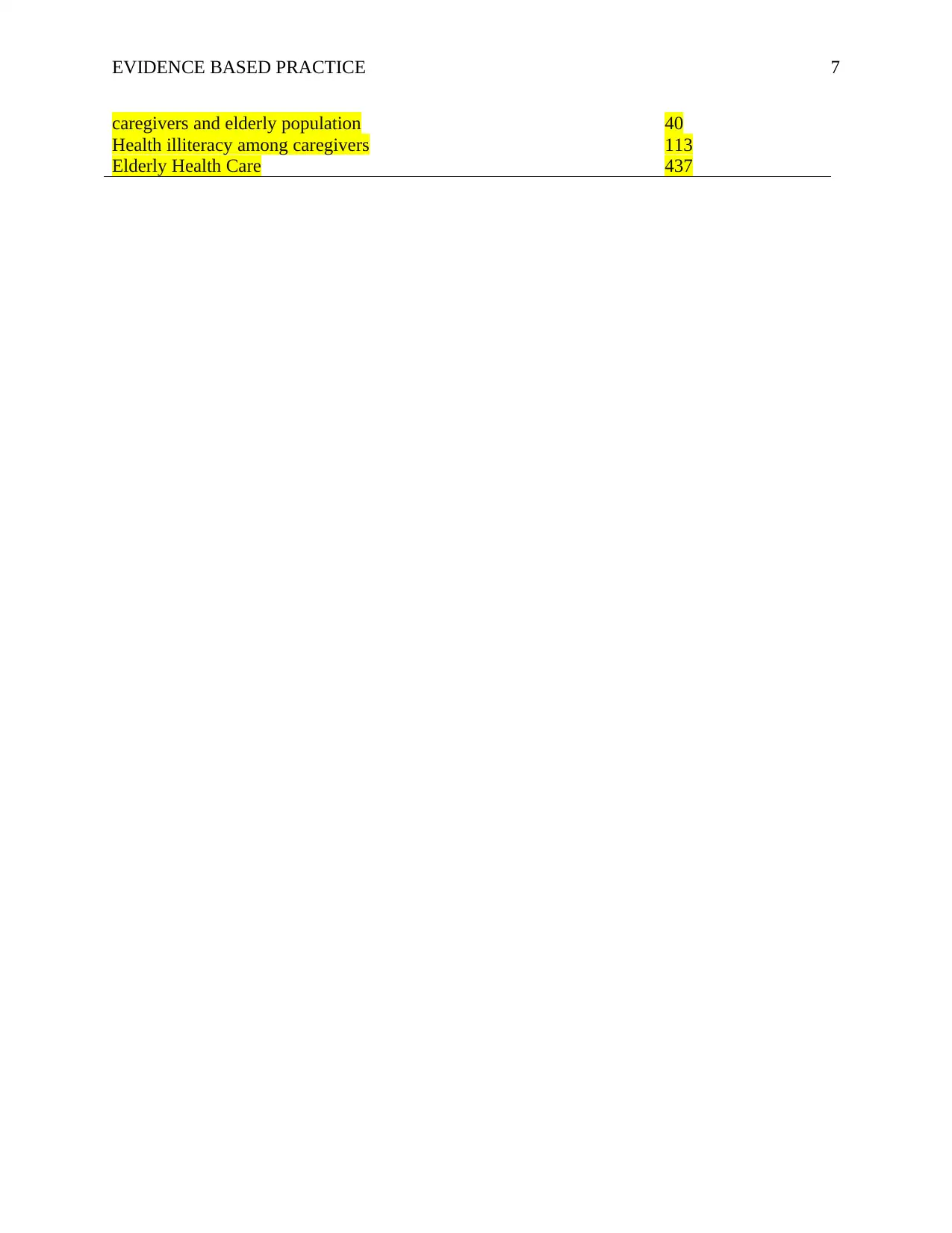
EVIDENCE BASED PRACTICE 7
caregivers and elderly population 40
Health illiteracy among caregivers 113
Elderly Health Care 437
caregivers and elderly population 40
Health illiteracy among caregivers 113
Elderly Health Care 437
Paraphrase This Document
Need a fresh take? Get an instant paraphrase of this document with our AI Paraphraser
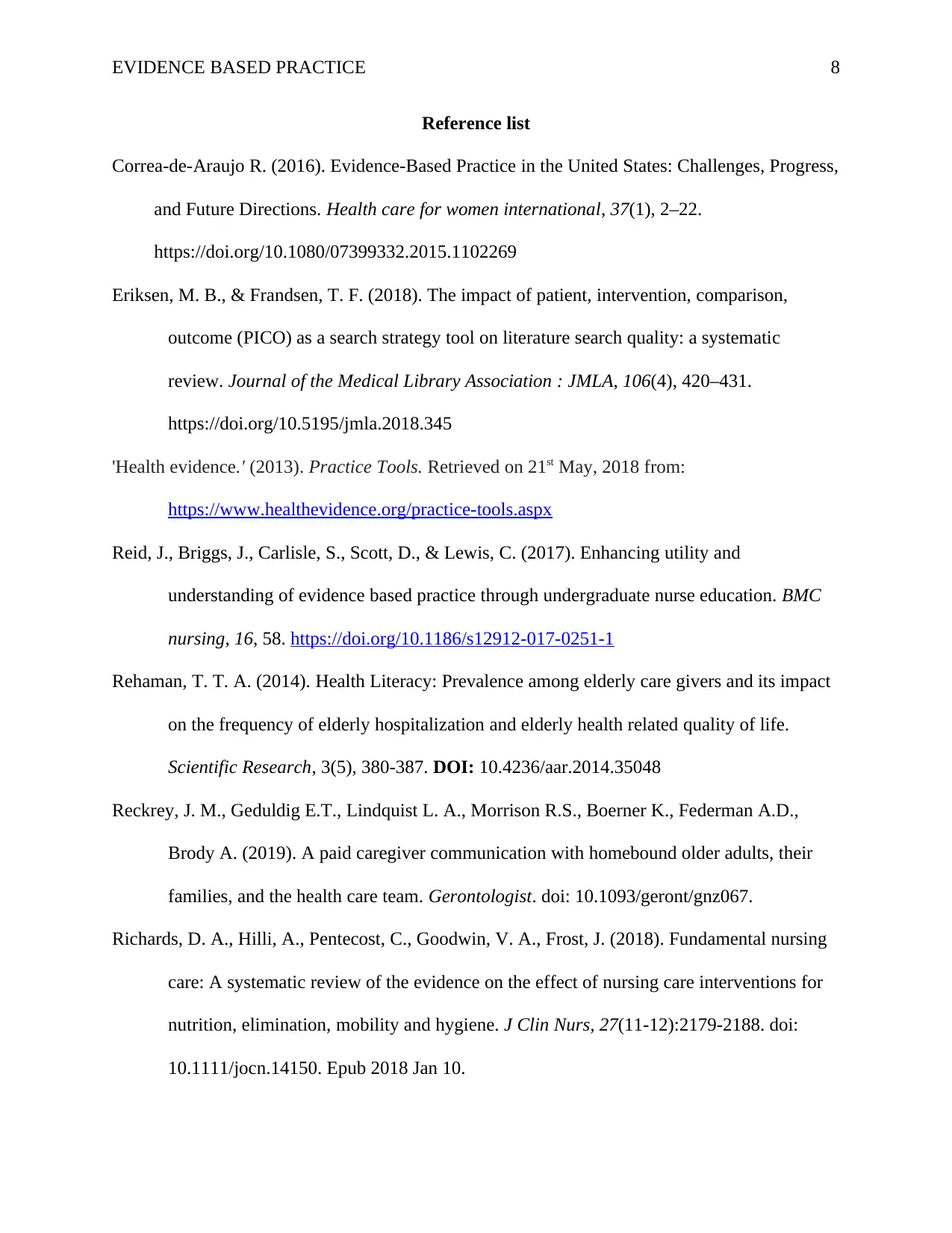
EVIDENCE BASED PRACTICE 8
Reference list
Correa-de-Araujo R. (2016). Evidence-Based Practice in the United States: Challenges, Progress,
and Future Directions. Health care for women international, 37(1), 2–22.
https://doi.org/10.1080/07399332.2015.1102269
Eriksen, M. B., & Frandsen, T. F. (2018). The impact of patient, intervention, comparison,
outcome (PICO) as a search strategy tool on literature search quality: a systematic
review. Journal of the Medical Library Association : JMLA, 106(4), 420–431.
https://doi.org/10.5195/jmla.2018.345
'Health evidence.' (2013). Practice Tools. Retrieved on 21st May, 2018 from:
https://www.healthevidence.org/practice-tools.aspx
Reid, J., Briggs, J., Carlisle, S., Scott, D., & Lewis, C. (2017). Enhancing utility and
understanding of evidence based practice through undergraduate nurse education. BMC
nursing, 16, 58. https://doi.org/10.1186/s12912-017-0251-1
Rehaman, T. T. A. (2014). Health Literacy: Prevalence among elderly care givers and its impact
on the frequency of elderly hospitalization and elderly health related quality of life.
Scientific Research, 3(5), 380-387. DOI: 10.4236/aar.2014.35048
Reckrey, J. M., Geduldig E.T., Lindquist L. A., Morrison R.S., Boerner K., Federman A.D.,
Brody A. (2019). A paid caregiver communication with homebound older adults, their
families, and the health care team. Gerontologist. doi: 10.1093/geront/gnz067.
Richards, D. A., Hilli, A., Pentecost, C., Goodwin, V. A., Frost, J. (2018). Fundamental nursing
care: A systematic review of the evidence on the effect of nursing care interventions for
nutrition, elimination, mobility and hygiene. J Clin Nurs, 27(11-12):2179-2188. doi:
10.1111/jocn.14150. Epub 2018 Jan 10.
Reference list
Correa-de-Araujo R. (2016). Evidence-Based Practice in the United States: Challenges, Progress,
and Future Directions. Health care for women international, 37(1), 2–22.
https://doi.org/10.1080/07399332.2015.1102269
Eriksen, M. B., & Frandsen, T. F. (2018). The impact of patient, intervention, comparison,
outcome (PICO) as a search strategy tool on literature search quality: a systematic
review. Journal of the Medical Library Association : JMLA, 106(4), 420–431.
https://doi.org/10.5195/jmla.2018.345
'Health evidence.' (2013). Practice Tools. Retrieved on 21st May, 2018 from:
https://www.healthevidence.org/practice-tools.aspx
Reid, J., Briggs, J., Carlisle, S., Scott, D., & Lewis, C. (2017). Enhancing utility and
understanding of evidence based practice through undergraduate nurse education. BMC
nursing, 16, 58. https://doi.org/10.1186/s12912-017-0251-1
Rehaman, T. T. A. (2014). Health Literacy: Prevalence among elderly care givers and its impact
on the frequency of elderly hospitalization and elderly health related quality of life.
Scientific Research, 3(5), 380-387. DOI: 10.4236/aar.2014.35048
Reckrey, J. M., Geduldig E.T., Lindquist L. A., Morrison R.S., Boerner K., Federman A.D.,
Brody A. (2019). A paid caregiver communication with homebound older adults, their
families, and the health care team. Gerontologist. doi: 10.1093/geront/gnz067.
Richards, D. A., Hilli, A., Pentecost, C., Goodwin, V. A., Frost, J. (2018). Fundamental nursing
care: A systematic review of the evidence on the effect of nursing care interventions for
nutrition, elimination, mobility and hygiene. J Clin Nurs, 27(11-12):2179-2188. doi:
10.1111/jocn.14150. Epub 2018 Jan 10.
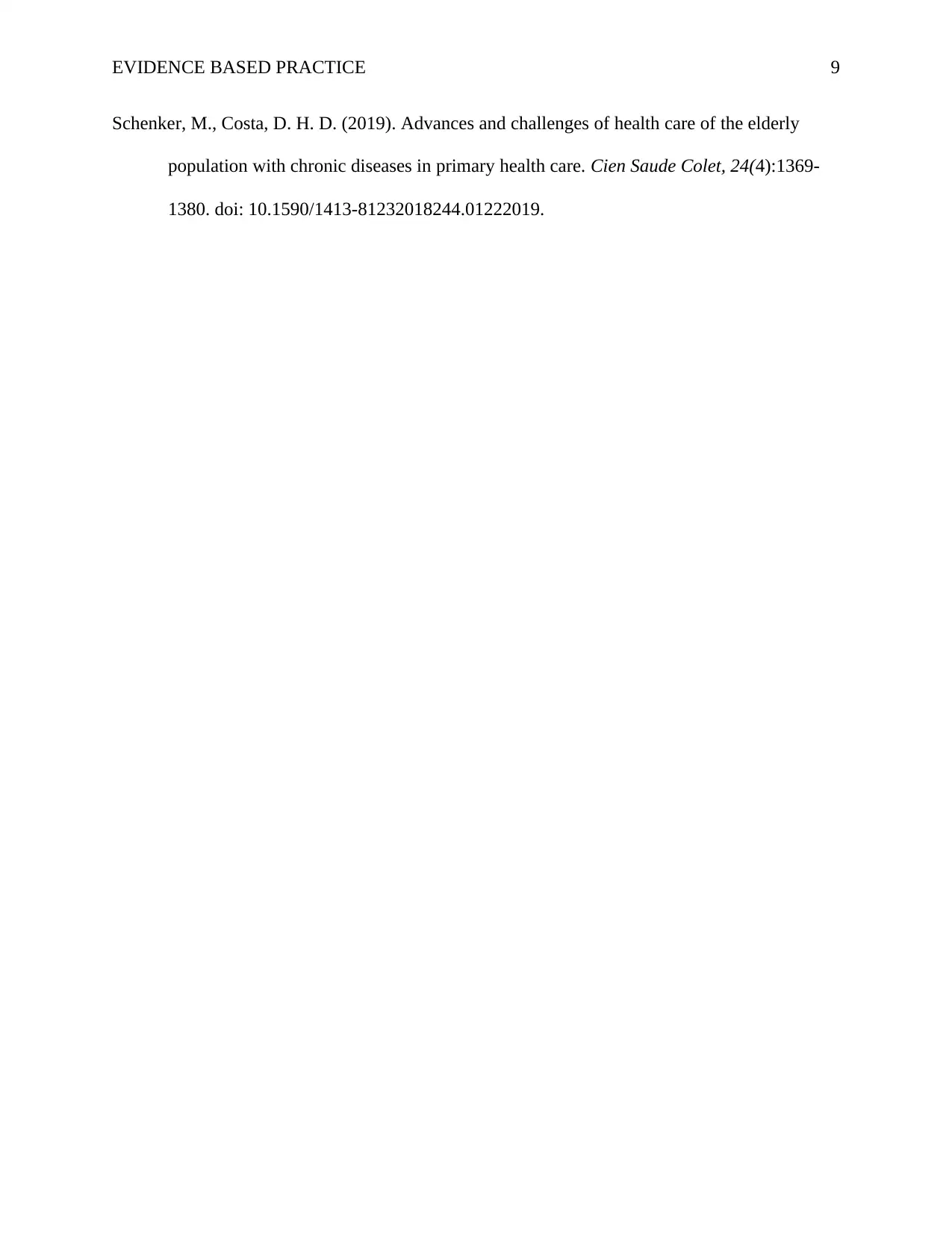
EVIDENCE BASED PRACTICE 9
Schenker, M., Costa, D. H. D. (2019). Advances and challenges of health care of the elderly
population with chronic diseases in primary health care. Cien Saude Colet, 24(4):1369-
1380. doi: 10.1590/1413-81232018244.01222019.
Schenker, M., Costa, D. H. D. (2019). Advances and challenges of health care of the elderly
population with chronic diseases in primary health care. Cien Saude Colet, 24(4):1369-
1380. doi: 10.1590/1413-81232018244.01222019.
⊘ This is a preview!⊘
Do you want full access?
Subscribe today to unlock all pages.

Trusted by 1+ million students worldwide
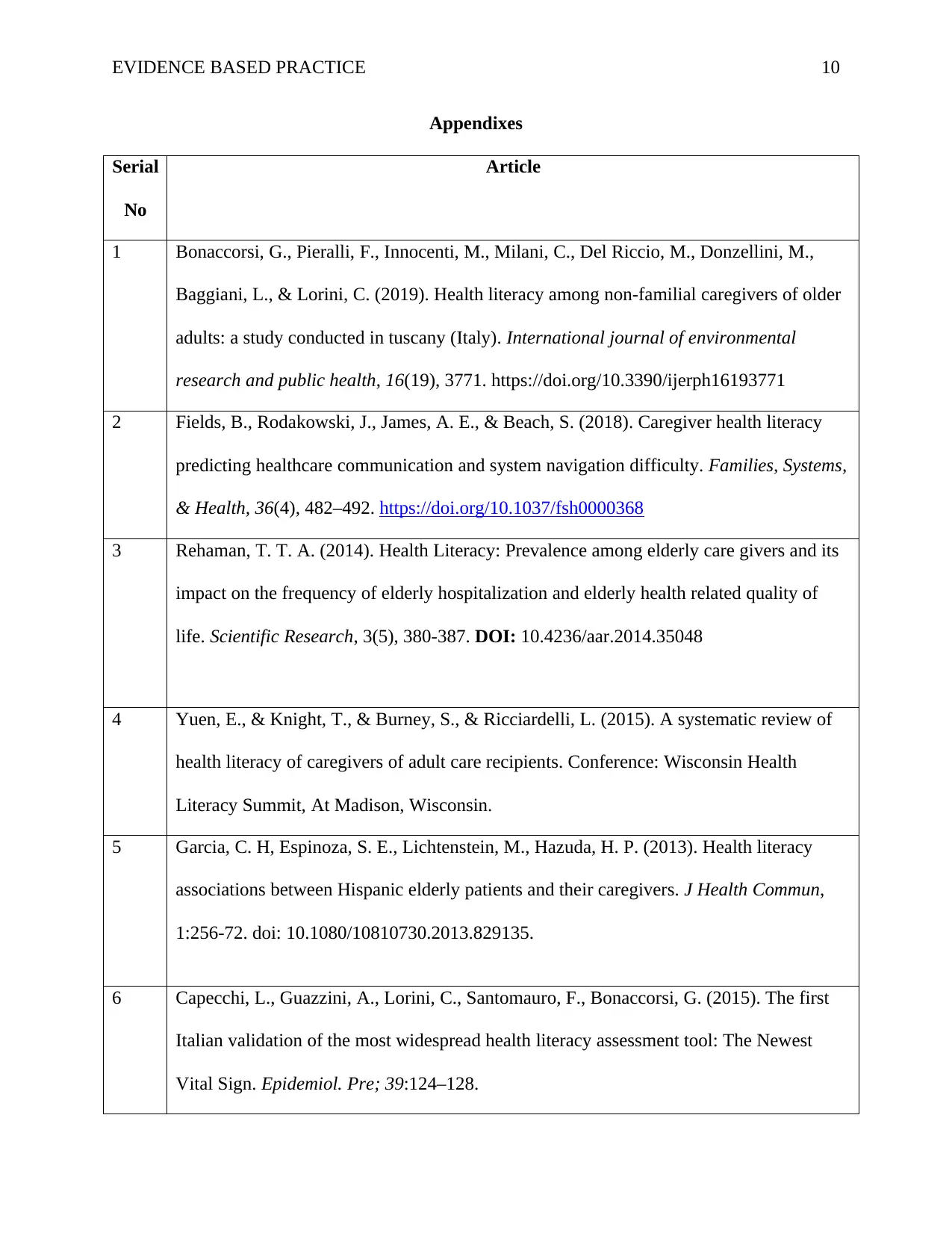
EVIDENCE BASED PRACTICE 10
Appendixes
Serial
No
Article
1 Bonaccorsi, G., Pieralli, F., Innocenti, M., Milani, C., Del Riccio, M., Donzellini, M.,
Baggiani, L., & Lorini, C. (2019). Health literacy among non-familial caregivers of older
adults: a study conducted in tuscany (Italy). International journal of environmental
research and public health, 16(19), 3771. https://doi.org/10.3390/ijerph16193771
2 Fields, B., Rodakowski, J., James, A. E., & Beach, S. (2018). Caregiver health literacy
predicting healthcare communication and system navigation difficulty. Families, Systems,
& Health, 36(4), 482–492. https://doi.org/10.1037/fsh0000368
3 Rehaman, T. T. A. (2014). Health Literacy: Prevalence among elderly care givers and its
impact on the frequency of elderly hospitalization and elderly health related quality of
life. Scientific Research, 3(5), 380-387. DOI: 10.4236/aar.2014.35048
4 Yuen, E., & Knight, T., & Burney, S., & Ricciardelli, L. (2015). A systematic review of
health literacy of caregivers of adult care recipients. Conference: Wisconsin Health
Literacy Summit, At Madison, Wisconsin.
5 Garcia, C. H, Espinoza, S. E., Lichtenstein, M., Hazuda, H. P. (2013). Health literacy
associations between Hispanic elderly patients and their caregivers. J Health Commun,
1:256-72. doi: 10.1080/10810730.2013.829135.
6 Capecchi, L., Guazzini, A., Lorini, C., Santomauro, F., Bonaccorsi, G. (2015). The first
Italian validation of the most widespread health literacy assessment tool: The Newest
Vital Sign. Epidemiol. Pre; 39:124–128.
Appendixes
Serial
No
Article
1 Bonaccorsi, G., Pieralli, F., Innocenti, M., Milani, C., Del Riccio, M., Donzellini, M.,
Baggiani, L., & Lorini, C. (2019). Health literacy among non-familial caregivers of older
adults: a study conducted in tuscany (Italy). International journal of environmental
research and public health, 16(19), 3771. https://doi.org/10.3390/ijerph16193771
2 Fields, B., Rodakowski, J., James, A. E., & Beach, S. (2018). Caregiver health literacy
predicting healthcare communication and system navigation difficulty. Families, Systems,
& Health, 36(4), 482–492. https://doi.org/10.1037/fsh0000368
3 Rehaman, T. T. A. (2014). Health Literacy: Prevalence among elderly care givers and its
impact on the frequency of elderly hospitalization and elderly health related quality of
life. Scientific Research, 3(5), 380-387. DOI: 10.4236/aar.2014.35048
4 Yuen, E., & Knight, T., & Burney, S., & Ricciardelli, L. (2015). A systematic review of
health literacy of caregivers of adult care recipients. Conference: Wisconsin Health
Literacy Summit, At Madison, Wisconsin.
5 Garcia, C. H, Espinoza, S. E., Lichtenstein, M., Hazuda, H. P. (2013). Health literacy
associations between Hispanic elderly patients and their caregivers. J Health Commun,
1:256-72. doi: 10.1080/10810730.2013.829135.
6 Capecchi, L., Guazzini, A., Lorini, C., Santomauro, F., Bonaccorsi, G. (2015). The first
Italian validation of the most widespread health literacy assessment tool: The Newest
Vital Sign. Epidemiol. Pre; 39:124–128.
Paraphrase This Document
Need a fresh take? Get an instant paraphrase of this document with our AI Paraphraser
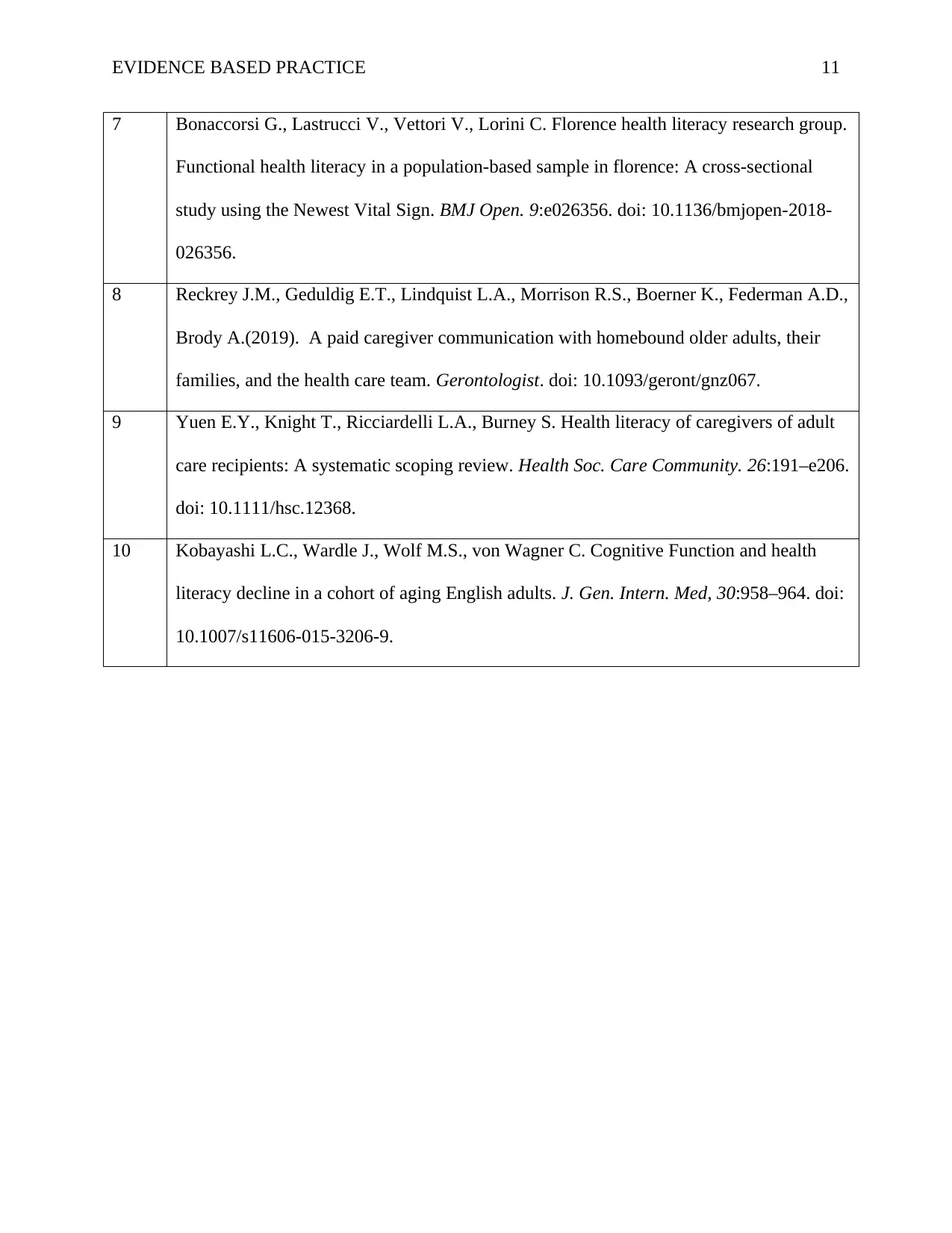
EVIDENCE BASED PRACTICE 11
7 Bonaccorsi G., Lastrucci V., Vettori V., Lorini C. Florence health literacy research group.
Functional health literacy in a population-based sample in florence: A cross-sectional
study using the Newest Vital Sign. BMJ Open. 9:e026356. doi: 10.1136/bmjopen-2018-
026356.
8 Reckrey J.M., Geduldig E.T., Lindquist L.A., Morrison R.S., Boerner K., Federman A.D.,
Brody A.(2019). A paid caregiver communication with homebound older adults, their
families, and the health care team. Gerontologist. doi: 10.1093/geront/gnz067.
9 Yuen E.Y., Knight T., Ricciardelli L.A., Burney S. Health literacy of caregivers of adult
care recipients: A systematic scoping review. Health Soc. Care Community. 26:191–e206.
doi: 10.1111/hsc.12368.
10 Kobayashi L.C., Wardle J., Wolf M.S., von Wagner C. Cognitive Function and health
literacy decline in a cohort of aging English adults. J. Gen. Intern. Med, 30:958–964. doi:
10.1007/s11606-015-3206-9.
7 Bonaccorsi G., Lastrucci V., Vettori V., Lorini C. Florence health literacy research group.
Functional health literacy in a population-based sample in florence: A cross-sectional
study using the Newest Vital Sign. BMJ Open. 9:e026356. doi: 10.1136/bmjopen-2018-
026356.
8 Reckrey J.M., Geduldig E.T., Lindquist L.A., Morrison R.S., Boerner K., Federman A.D.,
Brody A.(2019). A paid caregiver communication with homebound older adults, their
families, and the health care team. Gerontologist. doi: 10.1093/geront/gnz067.
9 Yuen E.Y., Knight T., Ricciardelli L.A., Burney S. Health literacy of caregivers of adult
care recipients: A systematic scoping review. Health Soc. Care Community. 26:191–e206.
doi: 10.1111/hsc.12368.
10 Kobayashi L.C., Wardle J., Wolf M.S., von Wagner C. Cognitive Function and health
literacy decline in a cohort of aging English adults. J. Gen. Intern. Med, 30:958–964. doi:
10.1007/s11606-015-3206-9.
1 out of 11
Related Documents
Your All-in-One AI-Powered Toolkit for Academic Success.
+13062052269
info@desklib.com
Available 24*7 on WhatsApp / Email
![[object Object]](/_next/static/media/star-bottom.7253800d.svg)
Unlock your academic potential
Copyright © 2020–2025 A2Z Services. All Rights Reserved. Developed and managed by ZUCOL.




